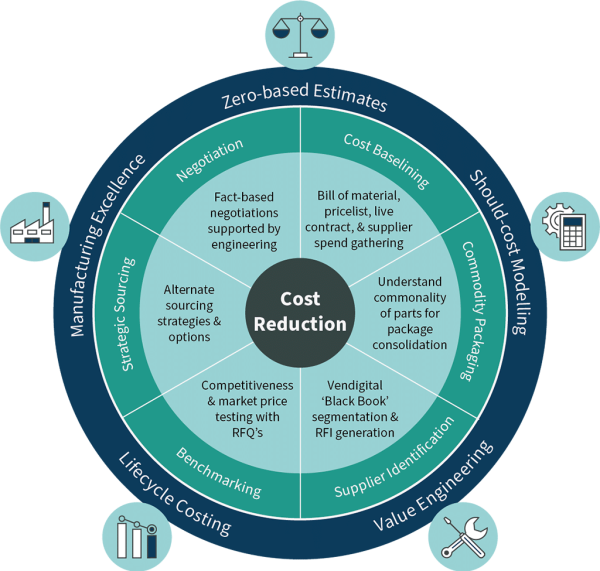
Putting factory-based production in the spotlight
Are manufacturers prioritising investment in digital capability and Industry 4.0 technologies?

In today’s business environment, effective cost management is critical for sustaining profitability and competitiveness. Strategic cost management holds significant importance across various domains, including supply chain management, manufacturing processes, and product development.
Commonly, ~80% of costs are fixed in during the product development stage. This makes it challenging for procurement or manufacturing teams to take out significant costs further down the line.
We know that businesses face distinct cost challenges in the following domains in particular, and there are some best practice approaches that can be taken to optimise the costs involved.
Product costs
Product development and pricing strategies are pivotal in determining a product’s competitiveness in the market. Here are some best practice approaches that can be applied to manage product costs effectively:
a) Should Cost Modelling: By breaking down the cost elements of a product, Should Cost Modelling facilitates a deeper understanding of cost drivers, enabling businesses to identify opportunities for cost optimisation throughout the product lifecycle.
b) Lifecycle costing: Assessing the total cost of a product over its entire lifecycle helps businesses understand the long-term cost implications of design and manufacturing decisions, thereby informing pricing strategies and identifying areas for cost reduction.
c) Commodity packaging: Optimising sourcing by analysing commonality of parts, to consolidate and create effective sourcing packages – this enables businesses to take advantage of economies of scale, simplified supplier management, streamlined inventory management, standardisation, and interchangeability.
Supply chain costs
Optimising supply costs without compromising risk, quality and efficiency is imperative. Key approaches for effectively tackling these costs include:
a) Strategic sourcing: By strategically selecting suppliers based on their ability to provide high-quality materials or services at competitive prices, businesses can effectively lower procurement costs within the supply chain. This can be supported by cost and engineering tools such as regional Should Cost modelling, which help to identify optimum regions to select suppliers from.
b) Effective supplier identification: Identifying reliable suppliers who offer cost-effective solutions is fundamental in reducing supply chain expenditure.
c) Negotiation: Effective negotiation skills can lead to securing favourable terms with suppliers, including pricing discounts, bulk purchase agreements, and flexible payment terms, thus directly impacting supply chain costs. Tools such as Should Cost modelling, and Zero-Based estimates allow procurement to design fact-based negotiations, by intrinsically understanding the bottom-up cost drivers of a product or service, including materials, labour, and overhead costs.
Manufacturing costs
Manufacturing processes constitute a significant portion of overall expenditure for many businesses. Optimising these processes is key to minimising costs and maximising profitability, with the following offering effective approaches for achieving this:
a) Manufacturing excellence: Building a bottom-up factory cost model, allows clear focus on optimising manufacturing processes through continuous improvement initiatives which can significantly reduce costs by minimising waste, improving efficiency, and enhancing quality.
b) Value Analysis and Value Engineering (VAVE): Employing value engineering and DfX principles enables businesses to optimise product design and features to achieve the desired functionality at the lowest possible cost, thereby directly impacting manufacturing expenses.
c) Cost baselining: Establishing a baseline for manufacturing costs allows for the tracking of cost trends over time, enabling businesses
Optimising product costs
Vendigital has a tried and tested rapid approach that uses cost engineering and procurement to forensically analyse and identify key cost drivers. By combining cost and value engineering methods with procurement, it is possible to deliver large cost savings at a product, factory or supply chain level.
Undertaking a rapid assessment involves identifying and analysing business data and variables to determine target areas, feasibility, and the levers required to deliver. Our methodology comprises three key stages:
1. Collate and analyse specification, cost and spend data
2. Complete workshops to validate cost build-up and generate ideas and opportunities
3. Create action plans to implement quick-wins and medium-term activities
The Cost Reduction Toolkit encompasses a methodology to seamlessly combine cost engineering derived data, along with procurement methodologies, to effectively design and implement fact-based sourcing, and negotiation with suppliers. All with the aim of helping clients to navigate this landscape with precision.

Using the tools in the outer (blue) circle provides quantitative, data-based analysis, which facilitate the selection, and implementation of procurement techniques from the inner (green) circle. This methodology has proven to be effective with our clients across multiple industries.
The specific selection of which tools to deploy is dependent on several factors including:
This toolkit can be deployed to address the distinct cost challenges within different domains and industries.
In conclusion, effective cost management across the supply chain, manufacturing processes, and product development is essential for businesses to remain competitive in today’s dynamic market environment. By leveraging the appropriate elements of our Cost Reduction Toolkit, businesses can streamline operations, reduce expenses, and ultimately enhance profitability.
Take control of your costs – book a 30 minute slot with one of our cost transformation experts
Curious how you could accelerate the journey to cost reduction in your business? Book a free, no-obligation 30-minute consultation with one of our cost transformation experts to discuss your current operational challenges, specific ambitions and explore tailored strategies to achieve your cost reduction goals.
To benefit from our team’s deep operational expertise, simply click the link below and we’ll come right back to you.
Sign up to get the latest insights from Vendigital
Related Insights

Are manufacturers prioritising investment in digital capability and Industry 4.0 technologies?

With the government’s renewed focus on upgrading national infrastructure, clean energy providers must ensure their supply chains and processes are fully optimised ahead of any increased demand.

When it comes to new product innovation (NPI), there’s no such thing as a one-size-fits-all approach and engineers often find that juggling different priorities leads to costly, late-stage design changes.
Subscribe to our newsletter
Take control of your costs – book a 30 minute slot with one of our cost transformation experts
Book a free, no-obligation 30-minute consultation with one of our cost transformation experts to discuss your current operational challenges, specific ambitions and explore tailored strategies to achieve your cost reduction goals.